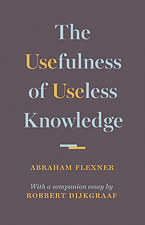
Abraham Flexner.
Princeton University Press, 2017; 93 pp;
ISBN: 978-0-69117-476-1.
by Alan Rauch
The Usefulness of Useless Knowledge, a title almost so delightful as to resist commentary was published as an essay in Harper’s magazine in 1939. Its author, Abraham Flexner (1866–1959), was the first director of Princeton’s now legendary Institute for Advanced Study, a center he helped create to allow for “the unobstructed pursuit of useless knowledge.” The essay has been reprinted with a cogent introduction by the institute’s current director the mathematical physicist, Robbert Dijkgraff.
Why reprint, and more to the point, why read Flexner’s essay now? The answer is apparent to anyone who has associated with the modern university over the last few decades. We are all faced with growing pressure to pursue larger and larger grants from increasingly dwindling resources. We have all been interrogated, particularly in the humanities, about the “use value” of both our programs and our research. Political entities, whether legislatures or assemblies, though often ill-informed about the practices of science and the humanities, are often blindly adamant about STEM programs, which are typically (and falsely) considered the only sure route to student employment. Assessment is all the rage, but the techniques of evaluation and improvement, such as Quality Enhancement Programs, are borrowed wholesale from the world of commerce.
In the area of scholarship, the evaluation of journal publications has almost succumbed to a system of “impact metrics” calculated to assess influence, occasionally at the expense of quality. In fact, just within the last year, former Canadian health minister Jane Philpott, who placed inordinate faith in a system of “smart” algorithms in order to evaluate grants in the field of medical research, was taken to task. The outcome of the new policy was, as might be expected, a disaster, and the Canadian scientific community was justifiably outraged. Eventually the former grant evaluation process was restored.
The scapegoat in common in all of these instances is what Flexner calls “useless” knowledge. That is, knowledge that does not have a clearly delineated use value and possibly even an immediate application. The sciences, humanities, and even technology have been coopted by a model of incentivizing systems that expect quick, visible and applicable uses that offer short-term rewards. Not that there is anything wrong with practical inventions, which Flexner and Dijkgraff would characterize as “useful knowledge,” rather we must also try to resist the attractions of instant gratification when supporting intellectual endeavours.
It is important to recall that the foundations of “useful knowledge” originate, as Flexner argues both eloquently and powerfully, in the exploration of “useless know-ledge.” We need, Flexner argues, to allow “the roaming and capricious possibilities of the human spirit” as an outlet of expression in the intellectual work that we call research. By way of example, Flexner observes that we applaud Marconi for his highly practical invention, yet we forget to appreciate James Clerk Maxwell and Heinrich Hertz “who had no concern about the utility of their work.” Hertz and Maxwell, he continues, “could invent nothing, but it was their useless theoretical work which was seized upon by a clever technician.”
Flexner, to be sure, is a little too hard on Marconi, but his point was well taken in its day, and is just as meaningful now. As Dijkgraff, writing in 2017, reminds us, “unfettered scholarship uplifts the spirits, heightens our perspective about the everyday, and shows us a new way to look at the familiar.”
It may be hard to argue against the fact that the views of Dijkgraff and Flexner seem to be idealistic musings of directors of what Flexner himself called an “educational utopia.” After all, the Institute for Advanced Study, neatly squared away in the rarified atmosphere of Princeton, cradled the minds of Albert Einstein, John Von Neumann, Erwin Panofsky, George Kennan, Hetty Goldman, Alan Turing, and Kurt Gödel, the enigmatic mathematical philosopher of incompleteness.
Nevertheless, the argument for “useless” knowledge is not predicated on “establish-ed” genius, but rather on a spirit of education that enables risk, experimentation and imagination. “A poem, a symphony, a painting, a mathematical truth, a new scientific fact,” insists, Flexner, “all bear in themselves all the justification that universities, college and institutes of research need or require.” Administrators may be skeptical of so-called idealism, but — to be mercenary for a moment — it is this kind of intellectual work that captures the enthusiasm of both donors and progressive legislators. Nor do we need to dismiss the merits of “useful knowledge” (an idea that has been around at least since Benjamin Franklin), but as this small book demonstrates so elegantly, the current climate of teleologically-driven priorities, demands a reevaluation of the wonderful and essential value of “useless” knowledge in the academy.
Alan Rauch is professor of English at the University of North Carolina at Charlotte.